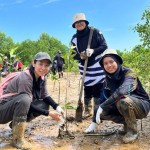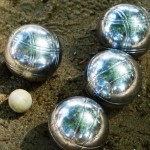12 October 2023, Thursday. It was a perfect sunny morning. Altogether, 160 students and 20 lecturers from the Faculty of Entrepreneurship and Business, Universiti Malaysia Kelantan gathered at the concrete jetty at Pantai Ndo, in Tumpat town. Participation from three internationals; one from China and two Pakistan made this event more eventful. Prior to the main agenda of the activity, i.e. mangrove saplings planting, all the participants got a welcome remark from Dr. Nazahatul Anis Amaludin, the MNS’s Chair of Kelantan, who amongst others welcome and thankful their participation in the activity as well as emphasized the importance of mangrove saplings planting to arrest coastal and fluvial erosion, and at the same time to arrest climate as mangroves can sequester or absorb twice amount of carbon dioxide compare with other tropical rainforest trees. The GROVE programme is an acronym of Green Revival Through Outreach, Value & Entrepreneurship programme was part of SULAM, University for Society, which was co-organised by UMK, MNS and EcoCare. Briefing by Muhammad Yazid, manager, EcoCare Kerteh ensued with a brief information and tips pertaining to mangrove saplings planting as well as safety procedure during the boat rides to the nondescripts islands of Delta Tumpat where planting activities were scheduled.
As for students from the Faculty of Entrepreneurship and Business, this kind of project was paramount important for them because they would get first hand-on experience pertaining environmental conservation and preservation. The participants, arming with long rubber boots, garden gloves, bucket hats on their heads left the jetty. They were divided into two groups; the first group which left the jetty earlier with two boats was responsible to plant saplings in the sandy area and the second group was in a muddy area which adjacent with one another. The views of lush greenery of mangroves, consisted of Rhizophora species intermittent with nipa palms on the both sides during the boat ride were indeed breathtaking. A flock of white egrets looking for foods on the edge of water captivated participations’ views. Haft way through the journey, they saw the mangrove trees were laden with their fruits, once ripen, the seedlings fall out of the fruit, drop into mud and sooner or later begin to grow. They, the participants also came across with a fisherman, nonchalantly, riding on his long tail boat to find suitable place to catch fish and crab. In terms of economic values, healthy mangrove ecosystems become habitats for crabs, fish and other aquatic life that can be sold as the source of family income, sustainability of the mangroves means he and other fishermen in the area can sustain their livelihood that depend on them.
A score of EcoCare staff including two intern students were always around, showing students how to dig a hole with straight hoe and how to remove polybags and to plant mangrove saplings and they would happy to talk and answered questions from students’ participants. Meanwhile students were told to place the taps which included name of the species, date of planting at the right height of a tree to ensure data available for subsequent visits to record and monitor their survival and growth. According to Muhammad Yazid, the probability of the saplings survival in Delta, Tumpat area is high –between 70 to 80 percent. Since saplings of mangrove trees were done in the area it reduced logistics cost. Using hoes, students, working in pairs tirelessly, digging and planting sapling from one hole to another until each and every single of them achieved their targets of trees per person. During planting, they giggling, joking, screaming, making planting activity as lively and happy vibes. The scorching hut sun above their heads would not dampen their spirits. The first group was considered lucky as they had not much problem to plant the trees as the site was in a relatively dry area and completed their jobs quite early. Once done, they went to the second location to give their hands to their fellow students. They were pleased to contribute to the cause for nature. At the same time, participants took photos and videos, recording their activities as for the report as well as for their memories. Choosing the best photos to upload in Facebooks. Enjoying working together they did not realise time flew so fast, within a few hours, altogether 1,600 mangrove saplings were successful planted. This effort has contributed to the Malaysian Greening Programme’s 100 million tree-planting campaign initiated by the Ministry of Natural Resources, Environment and Climate Change, the aims to inculcate awareness on the importance of forest area and to ensure the commitment to maintain forest area in Malaysia.
According to Dr. Mardhiah Kamaruddin, the Director of GROVE programme “this activity is an initiative to expose students with the integration of service learning programmes into students’ curriculum and from this mangrove planting programme, they are exposed with environmental issues and enhanced their soft skills like creativity and innovative and preparedness for the evolving and challenging demands of future workforce”. She added “we want our students to apply, explore, and engage with what they have learned and not only learn from the theories in the four wall of class room in the campus. According to Muhammad Afiq Aiman, fourth year student from Islamic and Banking programme, this activity is good to participate, he was excited as this was the first time he involved, and he hoped this activity can be continued and he was looking forward to participating to add more experienced during his study. According to Nurul Izzah Atirah, from programme of retailing, she said: “this mangrove planting programme is the best programme I ever participate”, as with Muhammad Afiq, this was her first experience, and she had interesting experienced to wade muddy areas to arrive at the planting spot. Although she was tired but she found fun, apart from planting trees she can network and knew other people. Zhu Lili, a PhD student from China, treasured her moment, and according to her; “my mother was indeed very happy when I told her I planted mangrove trees, she said planting more trees is a good thing for mankind, every shade will eventually become an umbrella for everyone”. As for Azizah Musa, a law lecturer, this was also her first experience in mangrove planting, she found the work was challenging as she needed to wade in the mud, but the rich knowledge and experience that she gained have been invaluable and would be shared with her students in whatever courses they are in to preserve the natural environment.
While, participants’ clothes shoes and boots covered and splattered with muds, they looked happy and satisfied for their contributions to the mother nature. Undoubtedly, such an exposure and involvement in mangrove planting will seed love for the nature. As for students who will be future entrepreneurs and managers, their decision will be very important, hopefully they will make wise decision to ensure nature is not at disadvantage. This activity which was outside of the four walls of classroom was a part of learning. Hopefully, this activity will not be the first and the last. SULAM, UMK’s programme with a strategic collaboration with MNS Kelantan Branch and EcoCare, provided a meaningful platform. GROVE’s mission fulfilled, the participants left happier than when they arrived.










